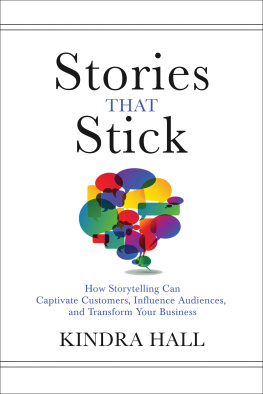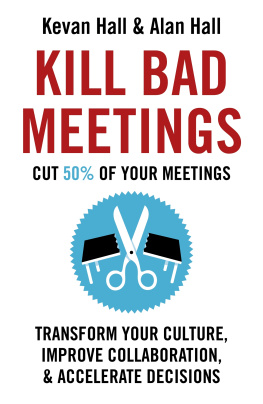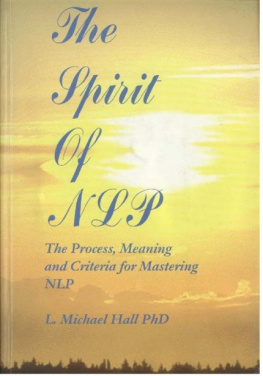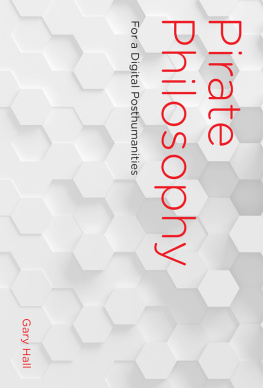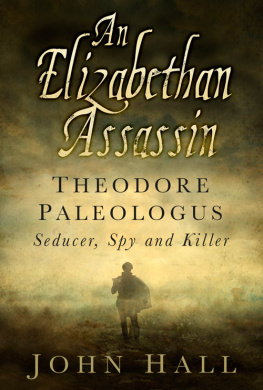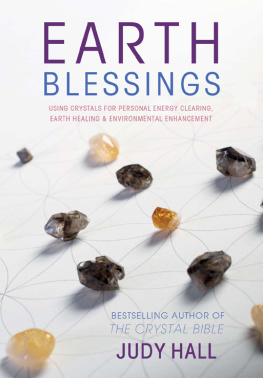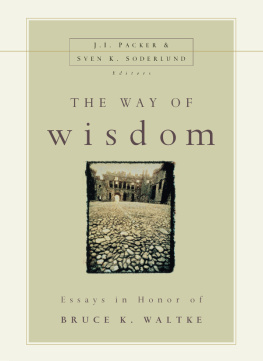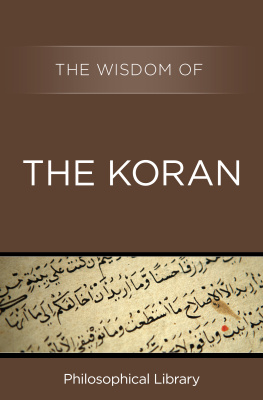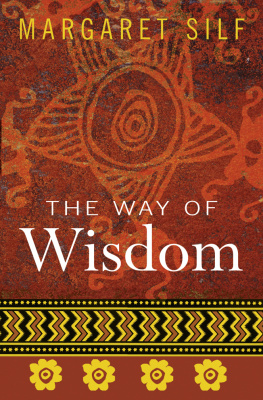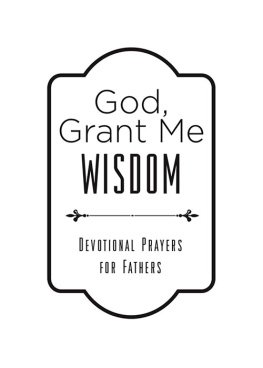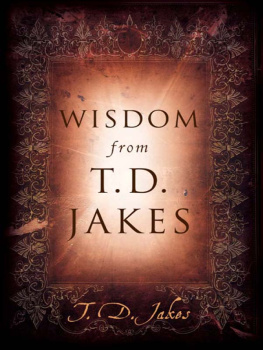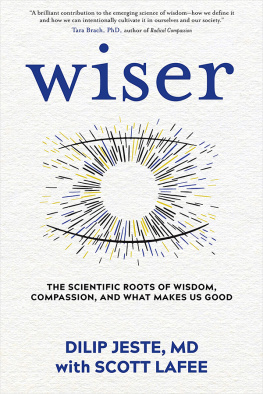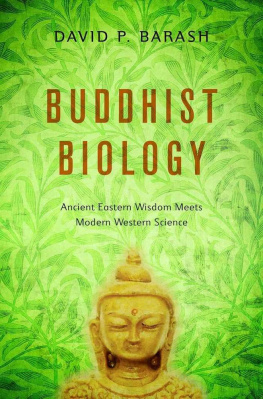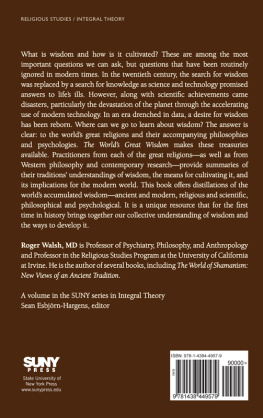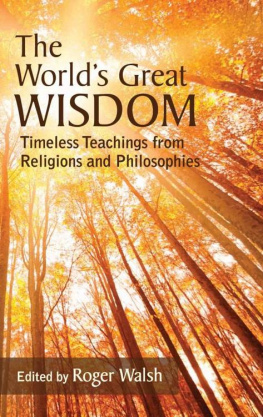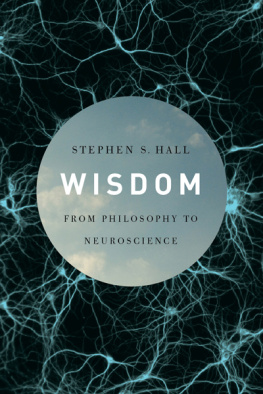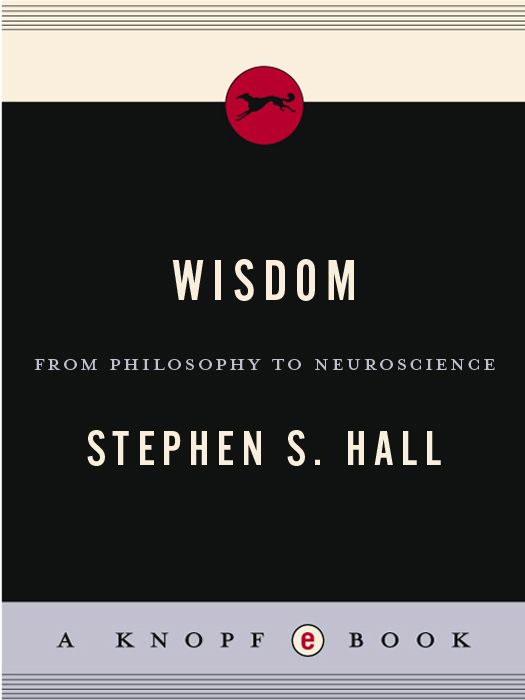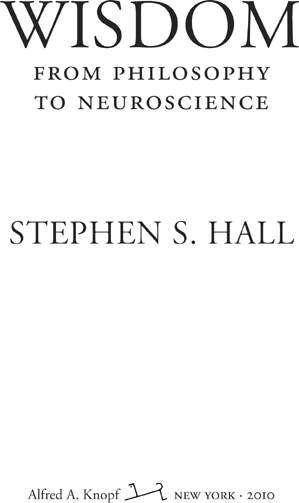ALSO BY STEPHEN S. HALL
Invisible Frontiers:
The Race to Synthesize a Human Gene
Mapping the Next Millennium:
The Discovery of New Geographies
A Commotion in the Blood:
Life, Death, and the Immune System
Merchants of Immortality:
Chasing the Dream of Human Life Extension
Size Matters: How Height Affects the Health, Happiness, and Success of Boysand the Men They Become
for Robert S. Hall
(19262008)
A word to the wise
and
Anne Friedberg
(19522009)
Man has two windows to his mind: through one he can see his own self as it is; through the other, he can see what it ought to be. It is our task to analyse and explore the body, the brain and the mind of man separately; but if we stop here, we derive no benefit despite our scientific knowledge. It is necessary to know about the evil effects of injustice, wickedness, vanity and the like, and the disaster they spell where the three are found together. And mere knowledge is not enough; it should be followed by appropriate action. An ethical idea is like an architects plan.
Gandhi
CONTENTS
PART ONE:
ONE
TWO
THREE
PART TWO:
FOUR
FIVE
SIX
SEVEN
EIGHT
NINE
TEN
ELEVEN
PART THREE:
TWELVE
THIRTEEN
FOURTEEN
FIFTEEN
PART ONE
WISDOM DEFINED (SORT OF)
You, my friend are you not ashamed to care so little about wisdom and truth and the greatest improvement of the soul, which you never regard or heed at all?
Socrates, defending himself at his trial
CHAPTER ONE
WHAT IS WISDOM?
The days of our life are seventy years,
or perhaps eighty if we are strong;
even then their span is only toil and trouble;
they are soon gone, and we fly away
So teach us to count our days
that we may gain a wise heart.
Psalm 90
That man is best who sees the truth himself,
Good too is he who listens to wise counsel.
But who is neither wise himself nor willing
To ponder wisdom is not worth a straw.
Hesiod
O N A BEAUTIFUL FALL MORNING nearly a decade ago, like hundreds of mornings before and since, I dropped off one of my children at school. Micaela, then five years old, had just started first grade, and the playground chatter among both the children and their parents reflected that mix of nervous unfamiliarity and comforting reconnection that marks the beginning of the school year. I lingered in the schoolyard until Micaela lined up with her teacher and classmates. She wore a pretty purple dress that my mother had just sent her, white socks, and pink-and-white-checkered sneakers. A hair band exposed her hopeful, eager, beautiful face. I sneaked in a last hug, as impulsive dads are wont to do, before she disappeared into the building. The time was about 8:40 a.m. As I left the schoolyard and began to head toward the subway and home to Brooklyn, I heard a thunderous, unfamiliar roar overhead. As the noise grew louder and closer, I froze in an instinctive crouch, much like the rats we always read about in scientific experiments on fear, wondering where the sound was coming from, knowing only that it was ominously out of the ordinary. Moments later, a huge shadow with metal wings passed directly over my head, like some prehistoric bird of prey. I instantly recognized it as a large twin-engine commercial airliner, but nothing in my experience prepared me for what happened next. I watched for the endless one two three four seconds it took for this shiny man-made bird to fly directly into the tall building that I faced several blocks away. In real time, I watched a 395,000-pound airplane simply disappear. Almost immediately black smoke began to curl out of the cruel, grinning incision its wings had sliced in the faade of the skyscraper.
In moments when lifes regular playbook flies out the window, when the ground shifts beneath our feet in a literal or figurative earthquake, we feel a surge of adrenalized fear at the shock of the unexpected. But right behind that feeling comes the struggle to make sense of the seemingly senseless, to try to understand what has just happened and what it means so that we will know how to think about a future that suddenly seems uncertain and unpredictable. In truth, the future is always unpredictable, which is why these moments of shock remind us, with unusual urgency, that we have a constant (if often unconscious) need for wisdom, too.
Although we now all know exactly what happened that terrible morning, the ground truth in lower Manhattan on September 11, 2001, was much fuzzier at 8:45 a.m. One of the hallmarks of wisdom, what distinguishes it so sharply from mere intelligence, is the ability to exercise good judgment in the face of imperfect knowledge. In short, do the right thingethically, socially, familiarly, personally. Sometimes, as on this day, we have to deliberate these decisions in the midst of an absolutely roaring neural stew of conscious and unconscious urgings. In one sense, I knew exactly what had happened long before the first news bulletin hit the airwaves. In a larger sense, someone watching television in Timbuktu soon knew vastly more about the big picture than I did. This may be an exaggerated example, but it is in precisely the murk of this kind of confusion that we often have to make decisions. So what did I do?
I went to a nearby shop and bought a cup of coffee.
It didnt occur to me until much later that this was a decision of sortsperhaps a foolish one, and certainly not an obvious one. But to the extent that I mustered even a dram of wisdom that day, it was in how I viewed the situation and what I thought was most important. Oddly, I felt little or no physical threat, despite such close proximity to the unfolding disaster; in some respects, the event played much scarier on TV than in person. My immediate focus, even then, was on the long-term psychological impact that such a calamity might have on a young child, and what (if anything) a parent might do to minimize it. I hadnt quite understood yet that that would be my mission for the day, but by standing in the street and sipping a cup of coffee, in that mysterious shorthand of human choice, I had chosen to stay close to my daughter, to stay calm, and, failing that, to fake parental calm realistically enough to convince her that this was a situation we could deal with.
But she didnt need to see the whole movie. I did not think it was a good idea for a young child to witness, as I did, human bodies falling like paperweight angels from the upper floors of the nearby tower. Even more, I did not think it was a good idea for a young child to absorb, even for a moment, the panic and despair written on the faces of all the adults who were beginning to comprehend that the world as they had known it, even a few minutes earlier, had suddenly changed, slipping irrevocably out of their (however illusionary) controlling grasp.
If youre thinking that Im offering a smug little narrative about wise parenting, not to worry. Wisdom doesnt come easily to us mortals, and Ive been reminded many times since that it probably didnt come to me that day, either. Many of the choices I made that morning were second-guessed by my wife, by my friends, and even by my daughter. More to the point, my small-minded plan to buffer Micaelas emotional experience was rudely interrupted by the collapse of 500,000 tons of metal, concrete, and glass. Just as teachers began to evacuate children from the school, the second tower came down, unleashing the kind of apocalyptic roar no child should ever have to hear, and a huge pyroclastic cloud of debris came boiling up Greenwich Street toward us. You couldnt tell if the cloud was going to reach us or not, but it wasnt a moment for contemplation. I picked up Micaela and we joined a horde of people running up the street. As I carried her in my arms, swimming upriver in a school of panicked fish, she was forced to look backward, downtown, right into the onrushing menace of our suddenly dark times. Even to this day, however, the thing Micaela remembers most about the evacuation is the moment her classmate Liam accidentally walked into a street sign when he wasnt looking.


